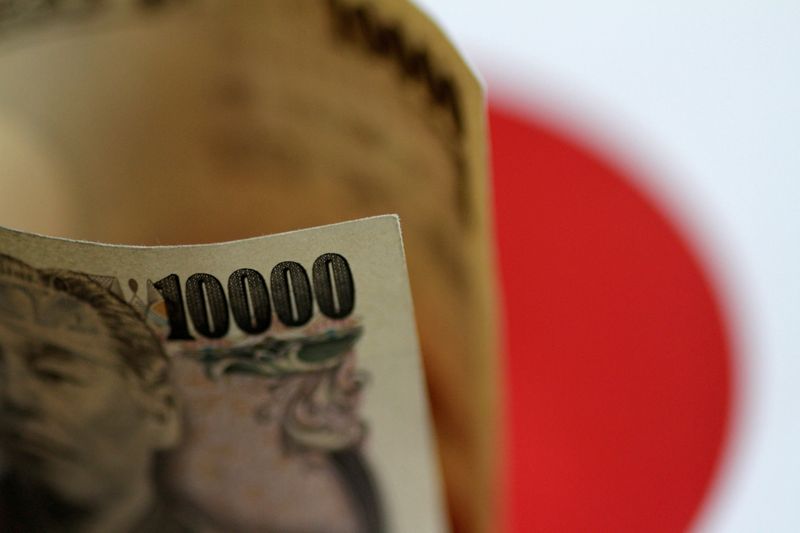By Leika Kihara and Tetsushi Kajimoto
TOKYO (Reuters) - Japan's current account surplus is likely to have deteriorated in August as the weak yen continues to inflate the cost of imports, casting doubt on the country's ability to amass foreign wealth and eroding the currency's prized safe-haven status.
The decline comes as Japan's foreign reserves, still the world's second largest after China, slumps after the government's dollar-selling intervention last month to arrest sharp yen falls.
The world's third-largest economy likely saw its current account surplus shrink to 122 billion yen ($84.15 million) in August, half July's level, according to a Reuters poll.
"Export volumes are weakening due to the global economic slowdown, while imports continue to balloon due to elevated energy prices and the yen's declines," said Takeshi Minami, chief economist at Norinchukin Research Institute.
The current account data is due at 8:50 a.m. on Oct. 11. (2350 GMT Oct. 10.)
Data released last month showed Japan ran its biggest single-month trade deficit on record in August as a 49.9% jump in imports, driven by surging energy costs and a slump in the yen, outstripped gains in exports.
While Japan continues to offset trade deficits with returns from overseas investment, its worsening balance of payments highlights structural changes in the economy that goes against its image as a trade powerhouse with sufficient ammunition to fund further dollar-selling intervention, analysts say.
Returns from overseas investments have grown steadily in recent years as a result of Japanese firms shifting production away overseas for years as a strong yen made their exports less competitive. Now, policymakers are more concerned the weak yen will drive up import bills and the cost of living.
Once seen as a sign of its export might and a source of confidence in its safe-haven yen, Japan's current account surplus has shrunk for four straight fiscal years through March due to the country's worsening trade balance.
Bank of Japan Governor Haruhiko Kuroda has warned that rising import costs, driven in part by the weak yen, would hurt households and companies by draining domestic wealth overseas due to its heavy reliance on fuel and food imports.
Advisers to Prime Minister Fumio Kishida's top panel also urged the government in April to prevent the current account surplus from shrinking further to avoid a damaging plunge in the yen.
Struggling to arrest unwelcome yen declines, Kishida is now seeking to maximise the benefits of a weak yen such as by drawing more inbound tourism and by promoting agricultural exports.
But analysts doubt whether Japan's economy can weather the mounting pain from rising inflation and darkening clouds over its export prospects as global recession risk looms.
"Japan's current account balance may swing to a deficit this year. Although I don't expect a deficit to stay for good, current account surplus will likely shrink as a trend," said Yoshimasa Maruyama, chief market economist at SMBC Nikko Securities.

"That might be a reflection of the declining earning power of Japan. To avoid falling into a decay, Japan must strive to make it more attractive as an investment destination."
($1 = 144.9800 yen)